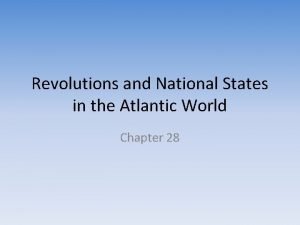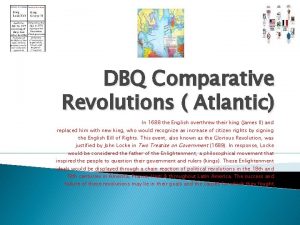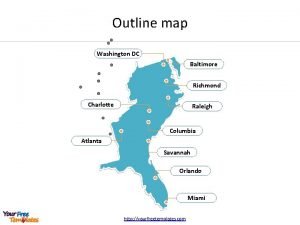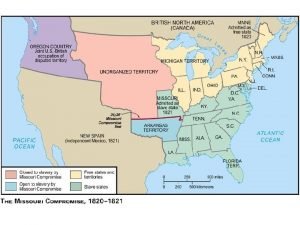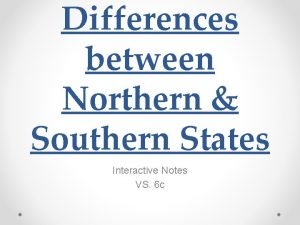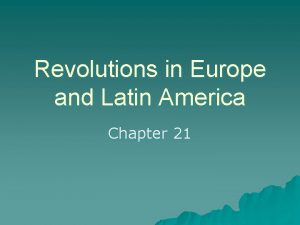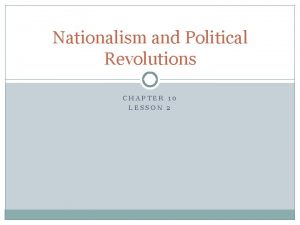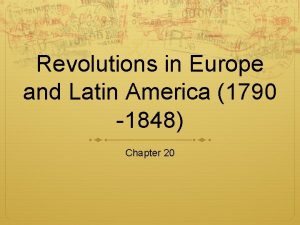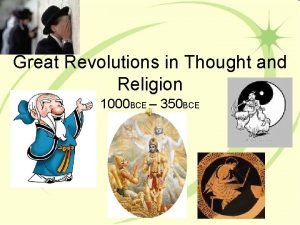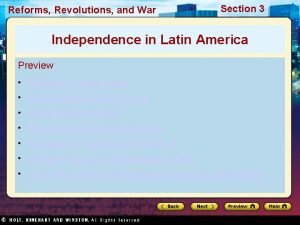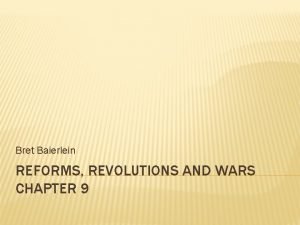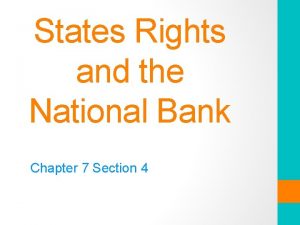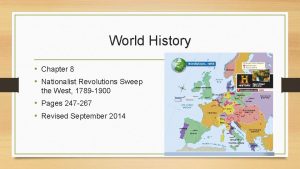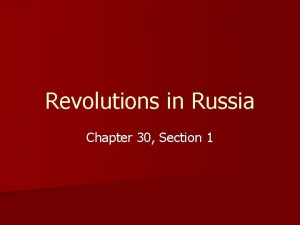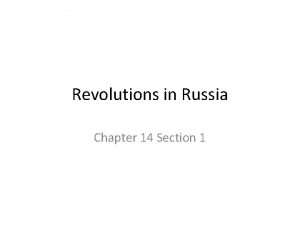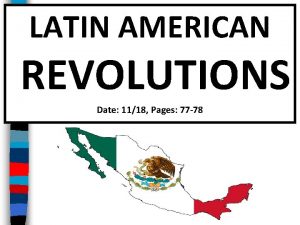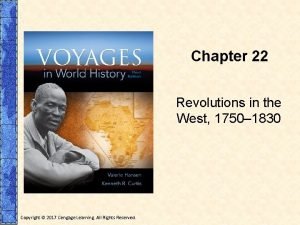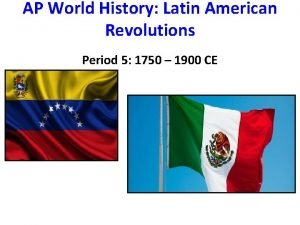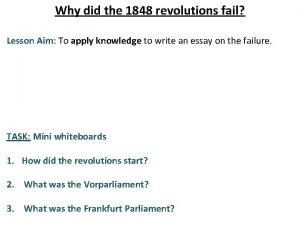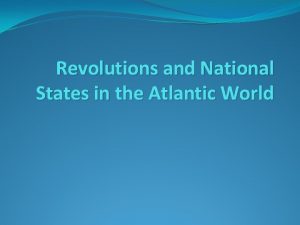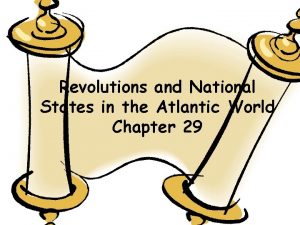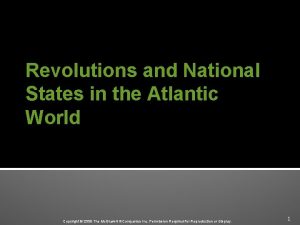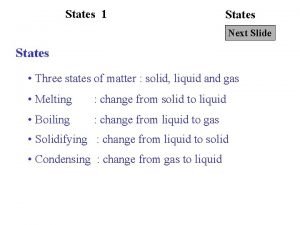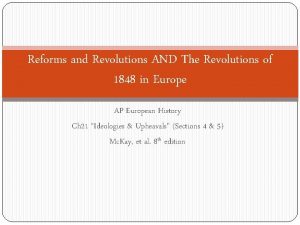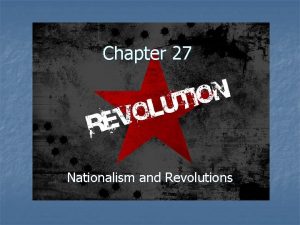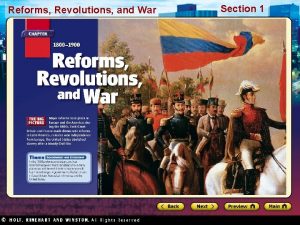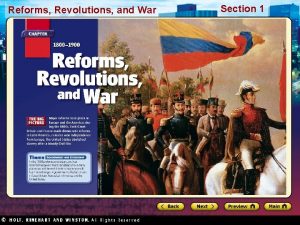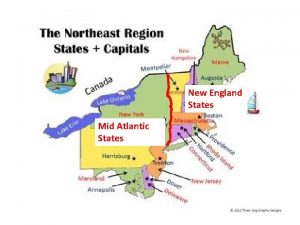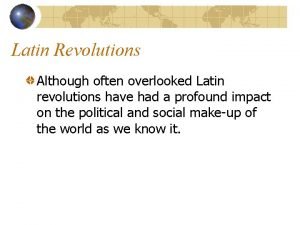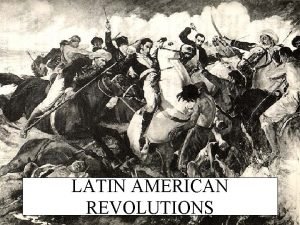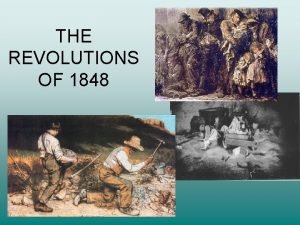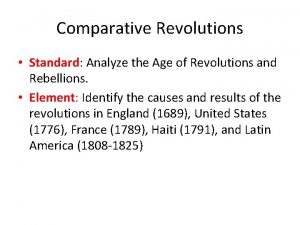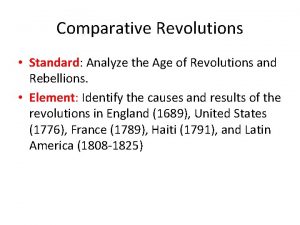Influences of the Atlantic Revolutions and National States




























- Slides: 28

Influences of the Atlantic Revolutions and National States in Europe

The Emergence of Ideologies • Ideology • A coherent vision of human nature, human society, and the larger world that proposes some form of political and social organization as ideal • Seeks to justify the current state of affairs or criticizes the status quo and arguing for movement toward improved society – Conservatism – Liberalism

Conservatism • Arose as response to the challenges of American and French Revolutions • View society as an organism that changes slowly • Many argued for protecting the monarchs of Europe • Edmund Burke – English political philosopher said gradual change came by general consensus, but not radical or revolutionary change – Leads to anarchy

Liberalism • Change is normal and an agent for progress • Manage change in best interest for society • In Europe, middle class business leaders and merchants • Wanted to give more power to elected parliaments, but only the educated and landowners would vote

Testing the Limits of Revolutionary Ideals: SLAVERY • Enlightenment thought inspires social activists to consider the possibility of the issues of slavery and women’s rights • Early critics: Olaudah Equiano • Abolitionist movements were most powerful in Britain – William Wilberforce (1759 -1833) attacked in Britain’s Parliament slavery as immoral – 1807 Britain’s Parliament passed Wilberforce’s bill that forbade slave trade • Emancipated them in 1834 – 1850 s Latin America abolishes it – Brazil in 1888 was the last – 1861 Russia abolishes serfdom out of fear • Resistance to abolition was strong among interested parties – Plantation owners, slave traders in Africa and Europe – Most intense in southern states in US during Civil War 1861’ 65

Abolition of Slavery • • • Often did not lead to expected results – Little improvement in the economic lives of former slaves • Ex. Sharecroppers in southern US, low-pay, indebted workers Unwillingness of former slaves to work on plantations led to a new wave of global migration, especially from India and China Few of the newly freed gained anything like political equality, except Haiti – Ex. Southern US –reconstruction followed by harsh segregation laws, denial of voting rights, lynching, racism – To former slaves, “nothing but freedom” Most former Russian serfs remained impoverished More slaves were used within Africa to produce export crops

Feminist Beginnings • • Began in Europe and N. America in 19 th c. - transatlantic European Enlightenment thinkers sometimes challenged the idea that women were innately inferior Elizabeth Cady Stanton – Built the Feminist movement in the US – Organized women’s rights conference in Seneca Falls, New York, in 1848 • Resolutions to vote, attend public schools, enter prof. occupations, participate in public affairs By 1900 – Small # in universities – Literacy rates growing – Jane Addams in US invented social work that became female-dominated – Florence Nightingale in Britain professionalized nursing

The Rights of Women? • Olympe de Gouges 1748 -1793 • Journalist, actress, playwright • Revolutionary and advocate for women’s rights • 1791 published A Declaration of the Rights of Woman and the Female Citizen • 1793 executed for her crusade for women’s rights

Women and Revolution • Parisian women were the leaders of the crowd that marched to Versailles, protested high food prices, and forced the king and queen to return to Paris in October 1789. Although women in France would have to wait until the twentieth century for political rights fully equal to those of men, women laid a foundation for future gains by drawing on the ideas of the Enlightenment to argue for equality.

Women’s Suffrage • 1893, New Zealand became the 1 st to give vote to women • 1906, Finland was the 2 nd • 1920, US with the passage of the 19 th Amendment of the Constitution • 1945, France

Nationalism



Cultural Nationalism • Seeks to deepen appreciation for the historical experiences of the national community and foster pride in its cultural accomplishments • See romantic views of Nationalism and History – Distinctive feature was its glorification of the individual and individual cultures – Especially in Germany – Revival of German folk culture Grimm Brother’s Fairy Tales

Grimm Brothers • Jakob and Wilhelm Grimm • Over 200 fairy tales that we know today • Concentrated on history and sense of national pride • First volume of fairy tales released in 1812 and another in 1814 • Celebrated being German and the German spirit

Political Nationalism • Nationalism had potential to stir up conflict between different groups of people – Jews are example – Jews didn’t inhabit a welldefined territory, but lived in states throughout Europe – As national communities tighten, they become distrustful of minority populations • Anti-Semitism: hate and violence against Jews • See it especially in Austria. Hungary, Germany, Russia

Zionism • Theodor Herzl 1896 publishes pamphlet Judenstaat, which called for mass migration of Jews to a land they could call their own • Founded the Zionist movement, which sought to confront anti-Semitism in Europe by establishing a home for the Jews in Palestine. • During the next half century Jewish migrants trickled into Palestine • Won right to Jewish state of Israel in 1948

Congress of Vienna The charming and polished courtier Prince Klemens von Metternich (standing at left center) dominated the Congress of Vienna. Here, delegates to the Congress are gathered at the Habsburg palace in Vienna.

Unification of Italy and Germany • Both had been disunited lands since collapse of Rome • Italy – Regional kingdoms, city states, Papal states ruled for more than 1, 000 years • Germany – Princes divided Germany into more than 300 semiautonomous jurisdictions • Holy Roman Empire claimed authority over Germany and Italy, but emperors never strong

Giuseppe Garibaldi 1807 -1882 • May 1860, Garibaldi leads a small army of 1, 000 men, known as the Red Shirts, to capture Sicily and Southern Italy • Revolutionaries flock to join him • In an election, voters give him permission to unite southern areas with Kingdom of Piedmont-Sardinia

The unification of Italy and Germany as national states in the nineteenth century fundamentally altered the balance of power in Europe.

Otto Von Bismarck • Prime minister that led them to unify • Debated legacy 1. Positive – Greatest and noblest of Germany’s statesmen – Unified & raised it to greatness 2. Negative – Devious politician who abused powers and led them into a dictatorship • By 1895, 650 books written about his life • Show him to be cunning and religious • “It is the destiny of the weak to be devoured by the strong. ” • “We Germans shall never wage aggressive war, ambitious war, a war of conquest. ”

German Unification • 1862 Kaisar Wilhelm I of Prussia appoints Otto von Bismarck as prime minister

Realpolitik • Bismarck a master of this style of politics • Means “the politics of reality” • Describes tough power politics with no room for idealism • Realism and practicality • Politics that are coercive, amoral, or “Machiavellian”

“The great questions of the day will not be settled by speeches or majority votes- that was the mistake of 1848 and 1849 - but by BLOOD and IRON” Otto von Bismarck

“Blood and Iron” bring Unification of Germany • Bismarck reforms and expands military • B/n 1864 and 1870 he intentionally provokes 3 wars w/Denmark, Austria, and France • All 3 wars crush opponents and intensifies German nationalism

Creation of the Second Reich 1871 Wearing a white jacket, Otto von Bismarck (center) witnesses the crowning of King Wilhelm I of Prussia as German emperor. The coronation followed the victory of Prussia over France in 1871, and it took place in the royal palace at Versailles. First Reich was the Holy Roman Empire Bismarck had achieved Prussian dominance by “blood and iron

Balance of Power Shifts • 1815 the Great Powers were nearly equal in strength – Britain, France, Austria, Prussia, Russia • By 1871, Britain and Prussia most powerful militarily and economically
 Revolutions and national states in the atlantic world
Revolutions and national states in the atlantic world Chapter 17 atlantic revolutions and their echoes
Chapter 17 atlantic revolutions and their echoes Atlantic revolutions global echoes
Atlantic revolutions global echoes Atlantic revolutions dbq
Atlantic revolutions dbq South atlantic states
South atlantic states Slave states free states
Slave states free states Southern states of america
Southern states of america Checks and balances dbq
Checks and balances dbq Revolutions in europe and latin america section 1 quiz
Revolutions in europe and latin america section 1 quiz French revolution political spectrum
French revolution political spectrum First and second industrial revolutions
First and second industrial revolutions Four great revolutions in thought and religion
Four great revolutions in thought and religion Chapter 8 the enlightenment and revolutions
Chapter 8 the enlightenment and revolutions Revolutions in europe and latin america
Revolutions in europe and latin america Pythagorean theorem
Pythagorean theorem Reforms revolutions and war answer key
Reforms revolutions and war answer key Wars revolutions and reforms
Wars revolutions and reforms Chapter 7 section 4 states rights and the national bank
Chapter 7 section 4 states rights and the national bank Chapter 8 nationalist revolutions sweep the west
Chapter 8 nationalist revolutions sweep the west Chapter 30 revolutions in russia
Chapter 30 revolutions in russia Revolutions in russia chapter 14 section 1
Revolutions in russia chapter 14 section 1 Chapter 8 nationalist revolutions sweep the west
Chapter 8 nationalist revolutions sweep the west Commercialization ap human geography
Commercialization ap human geography Latin american revolutions date
Latin american revolutions date 22 revolutions
22 revolutions Chapter 17 revolutions of industrialization
Chapter 17 revolutions of industrialization Building revolutions
Building revolutions Latin american revolution definition ap world history
Latin american revolution definition ap world history Why did the 1848 revolutions fail
Why did the 1848 revolutions fail
